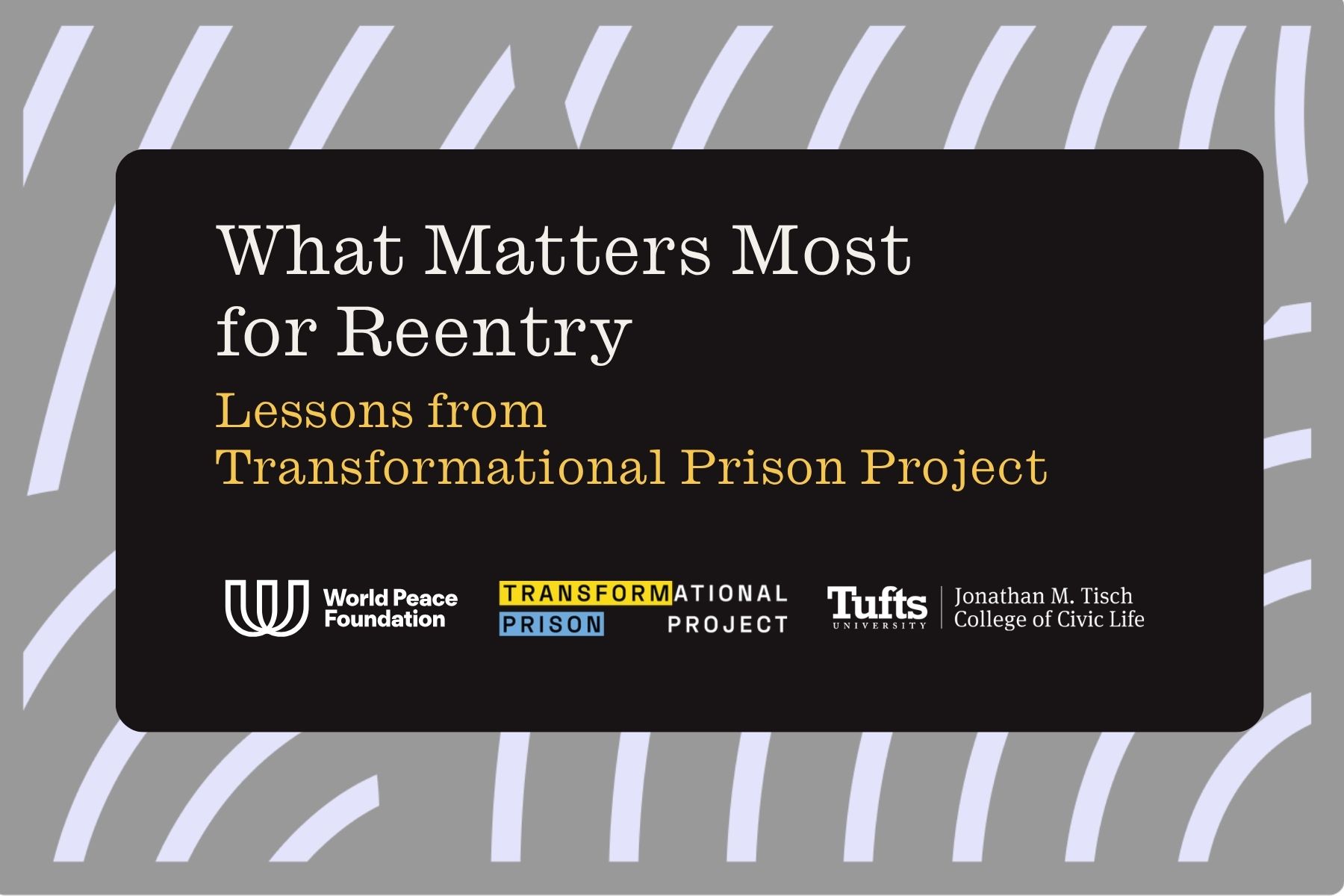Today the WPF is launching a new report, “What Matters Most for Reentry?: Lessons from the Transformational Prison Project,” by B.Arneson and Bridget Conley.
What kinds of support make the biggest difference for people returning to society after incarceration? This question guided a collaborative project between the Transformational Prison Project (TPP) and the World Peace Foundation (WPF), which examined the impact of TPP’s restorative, peer-led approach to reentry support. Through interviews with 30 individuals who participated in TPP programs, we found that the organization’s effectiveness stems not only from what it does, but how it does it.
The full report, “What Matters Most for Reentry: Lessons from Transformational Prison Project,” authored by B. Arneson and Bridget Conley, details our research findings and is now available on WPF’s website. It centers on the reentry journeys of the thirty people interviewed and their reflections on the impact of TPP’s work. Below, we highlight the key insights and offer policy recommendations based on their experiences.
Key Takeaways
First: Reentry is not composed of a clearly defined beginning, middle or end. Rather, it means learning to live – for many people we spoke with, for the remainder of their lives– in a grey zone of challenges and opportunities. Reentry is life after incarceration. This insight illuminates the importance of reentry support that nurtures individuals’ capacities to confront the harms they have experienced and caused, to strengthen interpersonal and community relationships, and to build lasting communities that extend well beyond any fixed timeframe labeled as “reentry.”
Second: Commonly known barriers to reentry (ID, housing, employment, medical insurance, and family reintegration) were cited as challenges. But equally important, people highlighted mental, emotional, and social factors that impact how they navigate life in reentry. People need to feel supported, heard, and cared for in order to overcome hurdles, envision and pursue new possibilities, and face the often-daunting challenges of reentry with the confidence that their community understands and supports them. The power of TPPs work is not merely that they provide insight, services, or recommendations, but that they approach the people they serve as part of a shared community, based on restorative principles and informed by their own lived experience of reentry.
Third: When support comes from someone who has experienced a reentry process, it enables more honest and direct communication, provides a relatable model for success, lends greater credibility to advice, and creates a more humanizing connection that better situates individuals for success. All 30 people we interviewed stated that working with TPP, people who had experienced reentry, made a crucial difference for them.
Fourth: Restorative justice provides a forum for meaningful accountability for harms perpetrated, helps people heal from past harms, serves as a springboard for healing relationships with community, and, for many, becomes a daily practice. In the context of reentry, RJ helps people see themselves as valuable contributors to their communities and empowers them to choose communities that appreciate and support them.
Policy Recommendations
Recommendation 1: Peer-led, restorative justice practices should be instituted across the criminal justice system, including:
- Further support for restorative justice practices throughout the criminal justice system, from the first point of contact through reentry. Guarantee access to RJ opportunities for all, with particular attention to majority Black and Brown communities.
- Ensure that restorative justice programming led by peer mentors is available to all incarcerated individuals who wish to participate—including those in the Department of Youth Services, as well as every jail, House of Correction, and prison.
- Expand support for peer-led, restorative justice programming as part of reentry processes.
Recommendation 2: End the prohibition that prevents formerly incarcerated individuals with felony convictions from spending time together.
- In practice, this prohibition does not prevent such gatherings; instead, it criminalizes the ability of individuals to rely on their support networks—particularly those who spent decades in prison and for whom the community they built inside served as family throughout their adult lives.
Recommendation 3: End lifetime parole.
- Parole termination should be a right for individuals who have demonstrated a sustained commitment to building a positive life after incarceration. For many, reentry is not a temporary phase but a lifelong process, marked by ongoing challenges in securing housing, employment, and navigating the social and psychological impacts of incarceration. Prolonged surveillance only worsens these conditions—it’s costly, unnecessary, and unjust for those who have shown they can successfully reintegrate and contribute to society.
Learn more about the project and access the full report and an executive summary.



